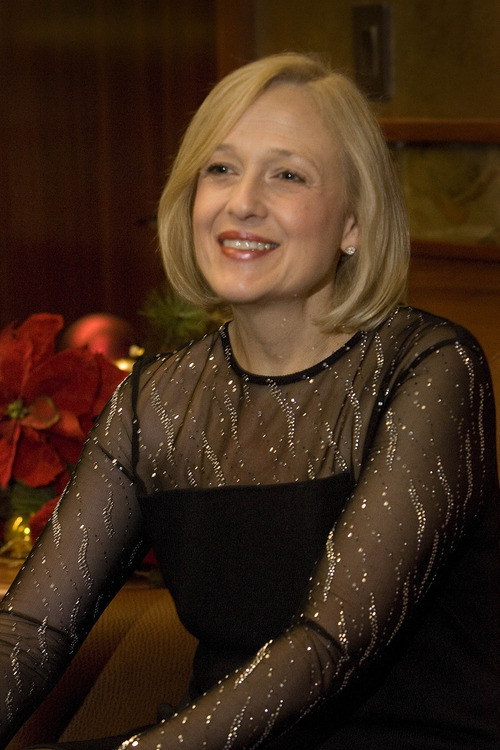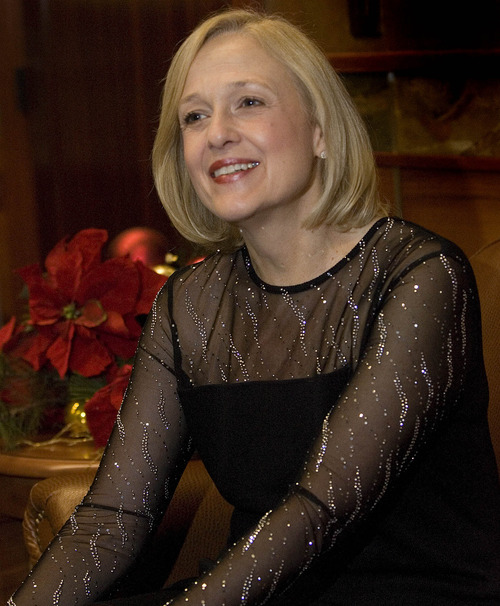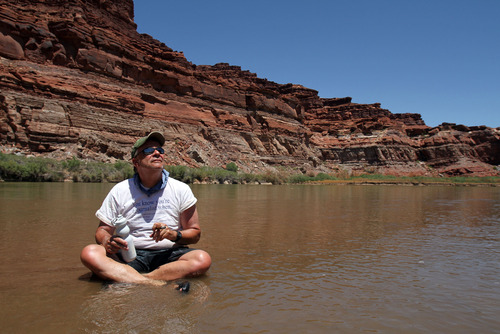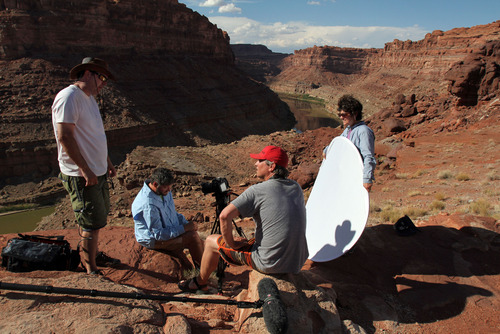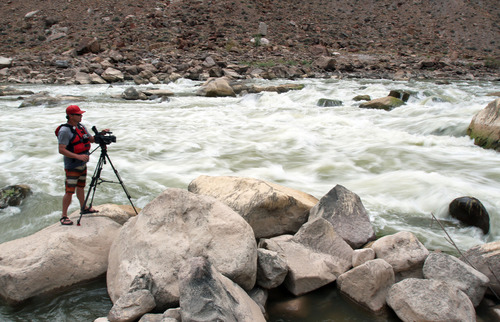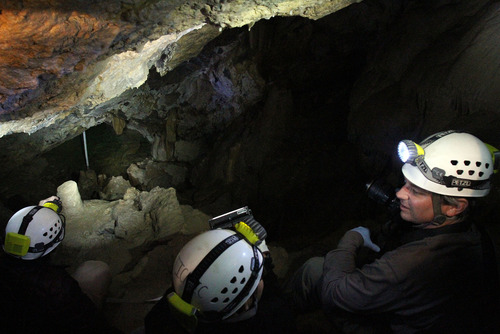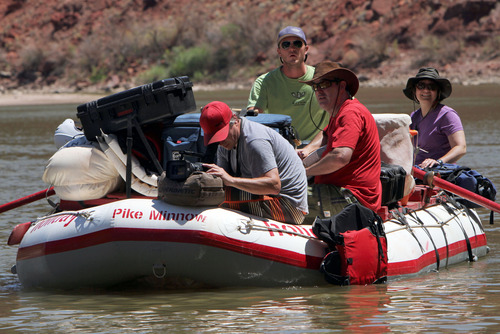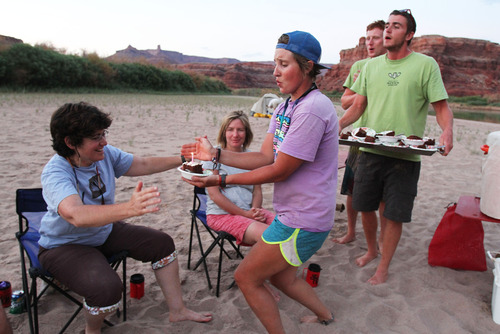This is an archived article that was published on sltrib.com in 2013, and information in the article may be outdated. It is provided only for personal research purposes and may not be reprinted.
In recent months, public television viewers have traveled the Grand Canyon, seen wild horses race across the West, spent time with homeless veterans and been entertained by the Piano Guys.
These shows aired on Public Broadcasting Service stations across the nation, but they were produced by Utah's KUED-Channel 7.
"As I go around the country and deal with my colleagues at other PBS stations, they're envious of what we're able to do here," said KUED general manager Michael Dunn. In addition to carrying national shows, such as "Frontline," "Nova" and "Downton Abbey," Dunn said the station is committed to being "Utah's best storyteller."
"Yes, we love our PBS programming," he said. "But we don't want to be just a pass-through station bringing you that. And, frankly, I think our significance and our relevance to the community in the future is going to be our ability to continue to bring you these great stories."
In 2012, KUED-Channel 7 spent $1,657,355 — 22 percent of its annual budget — producing 60 hours of local programming. That's a larger percentage of resources than most PBS stations, said Dunn.
With numbers like that, Channel 7 is going against the current trend. Outside the largest PBS stations in the largest TV markets, many stations across the country have given up on local production.
"We've seen other stations fold their local production tents," said Ken Verdoia, KUED's director of production. "And that comes at a terrible price."
Verdoia consults for other PBS stations, many of which can finance only one documentary per year. KUED has between six and 12 long-format documentaries in various stages of production at any time, he said. "That puts us up in the upper tiers with the WGBHs, with the WNETs, with the WETAs."
—
National recognition • KUED's quality programming hasn't gone unnoticed.
"I can tell you stations that do OK and the ones that really have stepped it up," said PBS president Paula Kerger. "And KUED is one that truly has stepped it up."
In each of the past 10 years, KUED has had at least two and as many as six of its productions air nationally on PBS.
In 2012, Channel 7's "Grand Canyon Seranade," "Horses of the West," "Street Vets" and "Five Rivers, Five Voices" were placed in the national PBS rotation. Those shows joined two editions of "Christmas With the Mormon Tabernacle Choir," PBS' most-watched holiday programs.
In March, "The Piano Guys" is airing more than 700 times on PBS stations across the country. The show is co-produced with KBYU-Channel 11. The Provo station operates under a different mission than KUED and does not produce documentaries.
"Your buttons burst just a little bit when you realize that's happening," Dunn said.
While the rest of the country might think Salt Lake City is a little backwater, the state is home to many talented people — including award-winning filmmaker John Howe.
"We've really built up a pretty good national reputation because of our shows, which are designed to compete with the best and go into the national schedules," said Howe, who says he looks for great stories with great characters. "That's sort of our formula for success."
But it takes more than even that to make it to the national arena.
"We're looking for interesting subjects that are well told," Kerger said. "We look for programs we think will have wider than just regional interest."
—
Local first • All this national success is the gravy for KUED. Leaders say the "meat and potatoes " of the station's work is still a focus on Utah and the West. Over the past few decades, Channel 7 has produced hundreds of original programs — and not just talking-head, public-affairs shows.
"There's a lot more to great TV than just having smart people sit and talk about the issues that touch our lives," Verdoia said. "There's getting out and seeing the issues. Experiencing them."
KUED has produced documentaries unique to Utah, including "The Struggle for Statehood," a biography of Brigham Young and a look at the history of polygamy. It also looks at current issues and the state's diverse cultures. And it produces documentaries about the region — from Yellowstone to the Grand Canyon and more.
Verdoia sees Utah storytelling as less of a mandate and more of a promise to serve the community and region.
"There's an important role for public television that is different and apart from other contemporary broadcast media," he said.
Commercial stations don't have the resources to produce local, long-form documentaries.
"I just feel grateful that we have the luxury of doing this kind of thing," Dunn said, "because our local news operations are not going to be able to do it, unless you consider a minute-and-a-half an in-depth story."
Working in public television is different from working in commercial TV, added KUED producer Nancy Green. "It's liberating as a storyteller, because you're not tied to ratings and advertisers. Instead, our measure of success comes from community involvement, engagement and support."
Jennifer Dahl, KUTV's director of news and operations, agreed that public and commercial television stations occupy different niches.
"Our mission is to provide quality local news seven days a week," she said. "It's very different from what they do."
Dahl praised the work KUED does, pointing specifically to the "Utah Vietnam Stories" that featured two of her staff — Sterling Poulson and Rod Decker.
"It was beautiful," she said.
Projects currently in production at KUED include a documentary about the history of Brigham Street — Salt Lake City's 100 South — and the Utah bucket list of things to do that features The Tribune's outdoor writer, Brett Prettyman.
KUED filmmakers also are hard at work on a documentary about the air quality in Utah.
"I'm just happy that we'll be able to take the time to really dive into that story and tell it well," Dunn said. "And, hopefully, it's something that spurs action."
KUED's 2012 Awards
Rocky Mountain Emmys
Environment Program/Special: "Five Rivers, Five Voices"
Documentary — Historical: "Utah's Freedom Riders"
Public/Current/Community Affairs — Program/ Special: "Climb for Life: A Legacy"
Audio — Live or Post Production: "Utah Vietnam War Stories: Escalation"
Director — Post-Production or Technical Director: "Horses of the West: America's Love Story"
Photographer — Program (Non-News):"Five Rivers Five Voices"
Writer — Program (Non-News): "Five Rivers Five Voices"
Student Long Form (Fiction and Nonfiction): "Navigating Freedom"
Samantha Highsmith, Producer
NETA Awards
Community Engagement: "Utah's Freedom Riders"
Content Production/Science & Nature: "Horses of the West: America's Love Story"
Utah Broadcasters/UBEE Awards
Best Lifestyle Program: "Climb for Life: A Legacy" (gold award); "Ethically Speaking: Perspectives of Utah Business Leaders" (bronze award)
Best Documentary: "Utah Vietnam War Stories: Escalation" (gold award); "Freedom's Promise" (silver award)
Society of Professional Journalists
Documentary: "Freedom's Promise" (first place)


